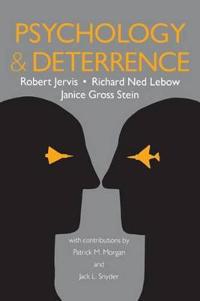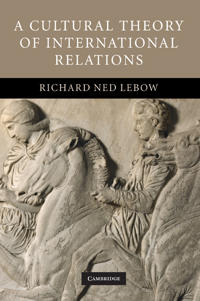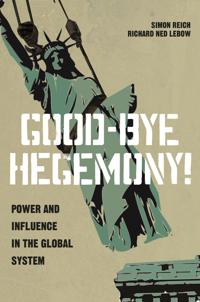Psychology and Deterrence (Pocket)
avRobert Jervis, Richard Lebow, Robert Jervis
ISBN: 9780801838422 - UTGIVEN: 1989-02Now available in paperback, Psychology and Deterrence reveals deterrence strategy's hidden and generally simplistic assumptions about the nature of power and aggression, threat and response, and calculation and behavior in the international arena.[...]
Why Nations Fight (Pocket)
avRichard Ned Lebow
ISBN: 9780521170451 - UTGIVEN: 2010-10Four generic motives have historically led states to initiate war: fear, interest, standing, and revenge. Using an original data set, Richard Ned Lebow examines the distribution of wars across three and a half centuries and argues that, contrary to conventional wisdom, only a minority of these were [...]
A Cultural Theory of International Relations (Pocket)
avRichard Ned Lebow
ISBN: 9780521691888 - UTGIVEN: 2009-01In this volume, Richard Ned Lebow introduces his own constructivist theory of political order and international relations based on theories of motives and identity formation drawn from the ancient Greeks. His theory stresses the human need for self-esteem, and shows how it influences political behav[...]
We All Lost the Cold War (Pocket)
avRichard Ned Lebow, Janice Gross Stein
ISBN: 9780691019413 - UTGIVEN: 1995-07-03Forbidden Fruit (Häftad)
avRichard Ned Lebow
ISBN: 9780691132907 - UTGIVEN: 2010-01Could World War I have been averted if Franz Ferdinand and his wife hadn't been murdered by Serbian nationalists in 1914? What if Ronald Reagan had been killed by Hinckley's bullet? Would the Cold War have ended as it did? In Forbidden Fruit, Richard Ned Lebow develops protocols for conducting robus[...]
Good-Bye Hegemony!: Power and Influence in the Global System (Inbunden)
avSimon Reich, Richard Ned Lebow
ISBN: 9780691160429 - UTGIVEN: 2014-04-23Good-Bye Hegemony! (Pocket)
avSimon Reich, Richard Ned Lebow, Simon Reich
ISBN: 9780691160436 - UTGIVEN: 2014-03Many policymakers, journalists, and scholars insist that U.S. hegemony is essential for warding off global chaos. Good-Bye Hegemony! argues that hegemony is a fiction propagated to support a large defense establishment, justify American claims to world leadership, and buttress the self-esteem of vot[...]
Between Peace and War (Häftad)
avRichard Ned Lebow
ISBN: 9780801832475 - UTGIVEN: 198402When is war is the result of a nation's deliberate decision to advance its vital interests by force of arms? When is it brought about by miscalculation? What causes policy-makers to misjudge the consequences of their actions? This book takes up these and other questions in a comparative study of the[...]
The Politics And Ethics Of Identity (Inbunden)
avRichard Ned Lebow
ISBN: 9781107027657 - UTGIVEN: 2012-08-30Challenges the notion of consistent unitary identities, arguing that we are multiple, changing selves, shaped by social contexts and processes.[...]











